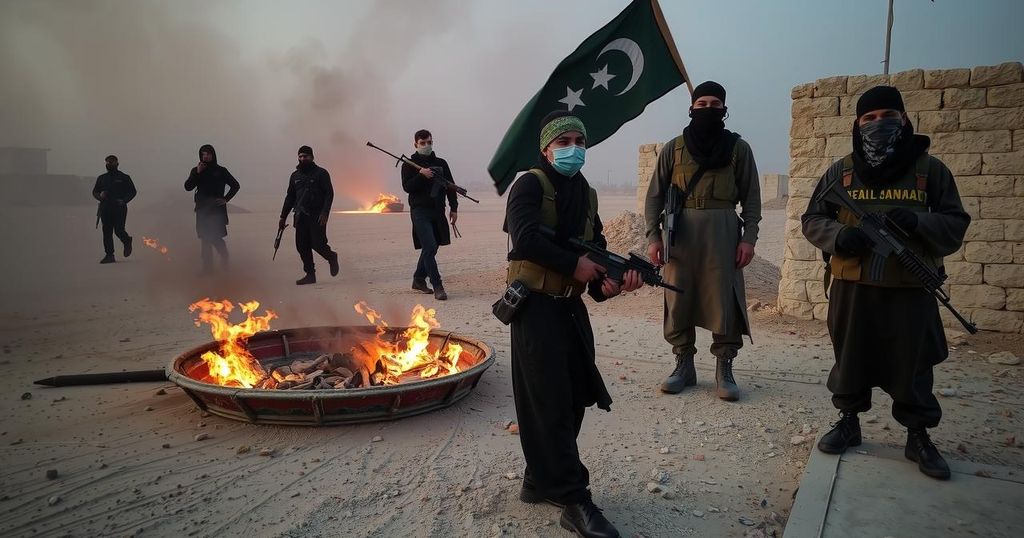Frustration Among Jihadists Amid Syria’s Cultural Shifts

Violent jihadists in Syria are increasingly frustrated by the new cultural shifts towards inclusivity and women’s rights. The commander of Damascus, Ahmed al-Sharaa, recently attempted to enforce traditional values by ousting female artists from a historic venue, demonstrating the growing tension as jihadists face a changing societal landscape. This struggle reflects a deeper conflict between extremist ideologies and evolving societal norms in war-torn Syria.
The frustrations among violent jihadists in Syria have reached a new peak as societal norms begin shifting in the war-torn nation. The new commander of the old city of Damascus, Ahmed al-Sharaa, recently ordered armed jihadists to remove female artists from a once-coveted Ottoman palace, citing their ‘improper behavior’ as fundamentally threatening to traditional values. This action reflects a broader tension within the jihadist factions as they grapple with Syria’s evolving cultural landscape, marked by the presence of modernity and a more prominent role for women. Compounding these challenges is the juxtaposition between the jihadists’ intentions for a strict enforcement of their ideology and the strong societal push towards inclusivity and artistic expression.
The environment in which these jihadists operate is becoming untenable, with the war reshaping the Syrian social fabric, thereby generating increasing frustration among those who wish to cling to a radical interpretation of society. The change in cultural dynamics poses a dilemma for these militants, as the rest of Syrian society embraces a differing vision of the future, one that firmly includes rights for women and artistic freedoms. Al-Sharaa’s attempts to enforce old ideologies in a space marked by new freedoms only fuels further frustrations, illustrating the clash between extremism and evolving social values in Syria today.
In summary, the recent events surrounding the changing dynamics of leadership in Syria highlight the clash between traditional jihadist ideologies and the realities of a society in transition. As more individuals embrace rights previously denied, jihadists find themselves at odds with a populace advancing beyond their rigid frameworks. This ongoing struggle suggests a potential fracturing among extremist factions as they confront a future that increasingly opposes their ideological foundations.
Syria has been embroiled in conflict since 2011, resulting in a fractured society and significant shifts in cultural norms. The rise of new leaders, such as Ahmed al-Sharaa, illustrates the attempt to re-establish control over a populace that is gradually leaning towards modern values, including gender equality and artistic freedom. This evolution in society poses a significant threat to violent jihadist factions who aim to impose their strict ideological principles amid a changing cultural landscape. The convoluted state of affairs in Syria has made it challenging for these groups to maintain a cohesive grip on their vision for the future. The ongoing tension between these factions and the reforms being embraced by the wider society showcases the difficulty in sustaining an extremist narrative in a fundamentally transforming environment. This clash between traditionalism and modernity represents a microcosm of broader geopolitical struggles that are prevalent throughout the region. Understanding these dynamics is crucial for comprehending the current challenges faced by jihadist groups within Syria.
In conclusion, the current frustrations among violent jihadist factions in Syria stem from a significant cultural shift towards inclusivity and modern values that challenge their extremist ideologies. The leadership changes, represented by figures like Ahmed al-Sharaa, indicate a movement towards embracing rights and freedoms that jihadists adamantly oppose. As the clash between these divergent societal visions intensifies, it is likely to exacerbate the internal strife among jihadist groups, highlighting their struggle to maintain relevance in a rapidly evolving environment. The ramifications of these tensions will be pivotal in shaping the future of not only Syria but the broader region as well.
Original Source: www.economist.com








